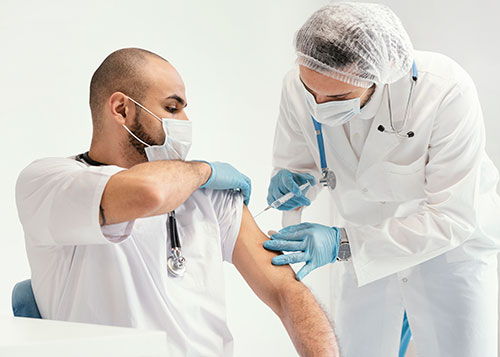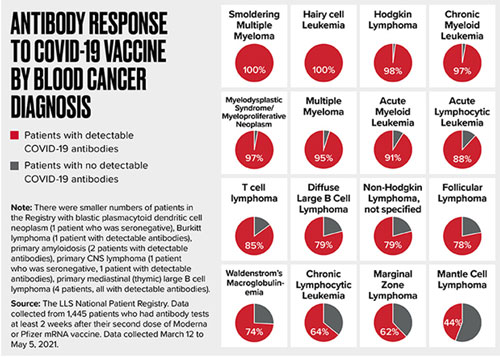Covid Vaccination in Blood Cancer Patients – Seronegative Rates and Need for Booster Dose!
Patients living with hematological malignancies are at high risk of COVID-19 infection. Like any other cancer, patients with blood cancers are also advised to get vaccinated against COVID infection as per their country’s vaccination schedule. We as doctors encourage patients to protect themselves from COVID infection by getting vaccinated and continuing to take preventive precautions including social distancing, wearing a mask and avoiding crowded and poorly ventilated indoor spaces.

This letter is not only to the patients with hematological malignancies, but also to their relatives and friends. This is in fact to stress that when others get vaccinated, they are not only protecting themselves, but are helping to protect these patients and millions of others with suppressed immune systems.
Inspite of receiving two doses of the COVID vaccine, some blood cancer patients developed good antibody responses whereas others did not. In a recent study by the Leukemia and Lymphoma Society in New York, it was found that adequate vaccine response in the form of detectable antibody levels was missing in one out of four blood cancer patients. The results varied depending on the type of blood cancer.
Responses Depending upon the Blood Cancer Type and Treatment:
-
Non-Hodgkin Lymphoma:
Non-Hodgkin Lymphoma (NHL) includes patients with diffuse large B cell, follicular, hairy cell, mantle cell, marginal zone lymphomas and Waldenstrom’s macroglobulinemia. In NHL patients, the prevalence of seronegativity (that is, no antibody response) ranged from 21 – 56 %. Patients treated with monoclonal antibodies such as rituximab which depletes B cells had poor vaccine responses.
-
Chronic Lymphocytic Leukemia:
In patients with chronic lymphocytic leukemia (CLL), more common in the western world adults, one-third (36%) of patients were seronegative after vaccination. Poor vaccine response rates occurred in patients who received treatment with anti-CD20 antibody (rituximab) or drugs that impaired B cell pathway including Bruton tyrosine kinase inhibitors (Ibrutinib) or Bcl-2 inhibitor (venetoclax).
-
Multiple Myeloma:
In patients with multiple myeloma, antibodies were detectable at a slightly higher proportion when compared to other blood cancers. The seronegative rate was estimated to be around 5-15% in different studies throughout the world.

With new variants of the SARS COV2 emerging day by day, the Delta variant consuming a lot of human life around the world, and with the percentage of India’s vaccinated population (only 9.5%) still lowcompared to the developed countries, it is necessary that patients with hematological malignancies adhere to the social distancing and personal protection norms and consult their treating doctor if exposed to COVID infected individuals.
FDA Approves Booster Dose for Immunocompromised:
The recent advancement in the protection of immunocompromised individuals from the deadly COVID-19 virus, is the approval of COVID vaccine booster dose by the Food and Drug Administration (FDA) for all immunocompromised patients (including organ transplant patients, those battling cancer and HIV) from August 2021. A booster dose is nothing but an additional dose of the vaccine to increase the antibody level which may lower after a certain period of time following the second dose of the vaccine.
The scenario in India:
While in developed countries like France, Germany and Israel, significant population have received both the doses of vaccine, a majority of India’s population is yet to receive the two scheduled doses of the vaccine. Although the National Institute of Virology director, Dr Priya Abraham and AIIMS director, Dr Randeep Guleria have advocated that booster doses might become a necessity in view of the emerging variants of the virus, the World Health Organization (WHO) has opposed the idea of booster doses until September 2021, to enable at least 10% of the global population to get vaccinated.
The current priority in India is to immunize the majority of the population with two doses of the vaccine rather than focusing on the booster dose. Whether the booster dose works or not, for the time being, we are sure that at least getting the scheduled two doses of vaccine will prevent severe infection and deaths related to COVID infection.
It is almost towards the end of 2021 now. The biggest step in preventing the third wave in India will be vaccination. So, get vaccinated and keep yourself safe.

Dr. Arshad Raja
Associate Consultant – Haematology and Haemato Oncology
Kauvery Hospital, Chennai

